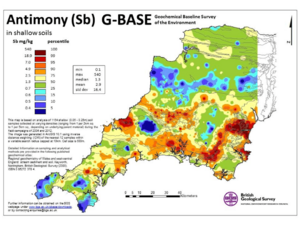Jane Plant facts for kids
Quick facts for kids
Professor
Jane Anne Plant
|
|
|---|---|
 |
|
| Born | 1 February 1945 Woodville, Derbyshire
|
| Died | 4 March 2016 (aged 71) |
| Education |
|
| Awards | CBE, FREng, FRSE, FRSA |
| Scientific career | |
| Fields | Geochemistry |
| Institutions |
|
Jane Anne Plant (1945–2016) was a very important British scientist. She was a leading expert in geochemistry, which is the study of the Earth's chemical makeup. Jane Plant was a pioneer in using geochemical surveys to understand our environment.
She worked as the Chief Scientist at the British Geological Survey. She was also a professor of geochemistry at Imperial College London. Jane Plant made history as the first female President of the Institution of Mining & Metallurgy. This role helped her connect with many important people in government, industry, and science.
Jane Plant faced cancer several times. This led her to study the possible link between dairy products and breast cancer. She wrote several books about her findings. In 1997, she received the CBE award for her great work in Earth science. She retired from the British Geological Survey in 2005. She remained a professor at Imperial College until she passed away in 2016.
Contents
Early Life and Education
Jane Plant was born on February 1, 1945, in Woodville, Derbyshire. Her parents, Ralph and Marjorie Lunn, ran a village shop. She was their only child.
Jane went to Ashby de la Zouche Grammar School. In 1963, she started studying at University of Liverpool. She was a brilliant student and graduated with top honors in geology. She even won a prize for having the best degree in her year.
A Career in Earth Science
Jane Plant spent most of her career at the British Geological Survey (BGS). She is famous for starting the "Environment and Health" research area there. This field looks at how the environment affects our health.
She joined the BGS in 1967 when she was 23. She was the first woman to be hired as a Scientific Officer. Before her, women were usually given technical or support roles. She led a project to map different elements in the Scottish Highlands.
In 1977, she earned her PhD from the University of Leicester. Her research was about mapping chemicals across Great Britain.
Mapping the Environment
Jane Plant created a special program called BGS Geochemical Baseline of the Environment (G-BASE). This program maps different chemicals on the Earth's surface. Scientists do this by testing samples of soil, water, and rocks.
The G-BASE program built a huge database of chemical information. This data helps us understand economic, health, and environmental issues. For example, Jane Plant used her maps to study health. She found a connection between low levels of selenium and heart disease in China. Her work helped create the field of environmental health.
Jane Plant's influence on science was huge. She received many awards and was a member of the Royal Commission on Environmental Pollution. This group advises the government on environmental issues.
Research on Diet and Health
In 1993, Jane Plant's research became very personal. She was diagnosed with breast cancer for the sixth time. She noticed that women in China had very low rates of breast cancer. She began to explore a possible link between cancer rates and eating dairy products.
Her research helped shape how geochemical mapping projects are done today. Jane Plant believed there was a strong connection between dairy and breast cancer. She thought it was similar to the link between smoking and lung cancer.
She explained that modern milk often contains more oestrogen because cows are milked while pregnant. Milk also has tiny proteins called growth factors. She argued these growth factors could encourage cancer growth. She was especially concerned about Insulin-like growth factor 1 (IGF-1) in cow's milk. She believed it might increase the risk of breast and prostate cancer.
Jane Plant suggested that people with cancer should follow their doctor's treatment. But she also recommended trying a dairy-free diet. Her diet was mostly plant-based and similar to a vegan diet. She was disappointed that the medical community did not widely accept her ideas. However, many people with cancer were interested and wrote to her for advice.
Her dairy-free diet was inspired by the eating habits in rural China. She followed this diet for 18 years and remained cancer-free. Later, her cancer returned a few more times. She believed this happened because she became less strict with her diet. Jane Plant passed away in 2016 from a blood clot after chemotherapy.
Important Discoveries
Besides writing books, Jane Plant wrote many scientific reports and papers. One of her studies looked at geological problems using geochemical maps. She found that in the Scottish Highlands, changes in the land were linked to how sediments were formed. She also discovered three belts of special rocks called ultramafic rocks in the Scottish Highlands. Each of these rock belts was connected to changes in how sediments were laid down.
In a more recent article, she explored how man-made chemicals increase pollution. She looked at their impact on people and the Earth's ecosystems. She also talked about how people view the risks of radioactivity. Jane Plant supported ideas like “biomimicry” and green chemistry. These methods aim to reduce waste and protect the environment. She believed that pollution and damage caused by human population growth threaten the Earth's future.
Awards and Recognition
Jane Plant received many important awards for her work:
- 2012: Fellow of the Royal Academy of Engineering
- 2005: A life Fellow of the Royal Society of Medicine
- 2005: Honorary doctorate from the University of Leicester
- 2005: An Honorary Doctor of Sciences degree from Keele University
- 2004: Honorary Doctorate of Åbo Akademi University, Finland
- 2003: An Honorary Doctor of Sciences Degree from Kingston University for her work in Environment and Earth Sciences
- 2002: Fellow of the Royal Society of Edinburgh
- 2001: Honorary Doctorate of the University of Exeter, for her work in Earth Sciences
- 2000: Fellowship of the Royal Society of Arts
- 1999: Freeman of the City of London
- 1999: Lord Lloyd of Kilgerran Award for applying science and technology to benefit society
- 1997: CBE (Commander of the Order of the British Empire) for her contributions to Earth Sciences
- 1997: Honorary Doctorate of the Open University for her academic achievements
- 1985: The Murchison Fund of the Geological Society
 | Toni Morrison |
 | Barack Obama |
 | Martin Luther King Jr. |
 | Ralph Bunche |


